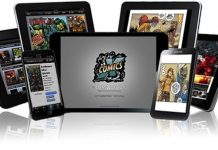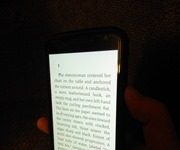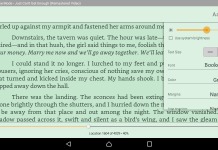![]() In news that will come as no comfort to Jonathan Franzen and other Luddite technophobes, the Pew Research Internet Project has found that if anything, younger Americans are more likely to read books than their immediate seniors, have more respect for offline/dead-tree sources of knowledge, and are at least as involved with their local libraries as their elders.
In news that will come as no comfort to Jonathan Franzen and other Luddite technophobes, the Pew Research Internet Project has found that if anything, younger Americans are more likely to read books than their immediate seniors, have more respect for offline/dead-tree sources of knowledge, and are at least as involved with their local libraries as their elders.
“Over three-quarters (77%) of younger Americans have a smartphone, and many also have a tablet (38%) or e-reader (24%),” says the Pew Research summary. “Despite their embrace of technology, 62% of Americans under age 30 agree there is ‘a lot of useful, important information that is not available on the internet,’ compared with 53% of older Americans who believe that.”
Furthermore, “young adults are more likely to have read a book in the past 12 months. Some 43% report reading a book—in any format—on a daily basis, a rate similar to older adults. Overall, 88% of Americans under 30 read a book in the past year, compared with 79% of those age 30 and older.” That said, there doesn’t appear to be a huge generational divide in ebook reading versus print book reading. “Young adults have caught up to those in their thirties and forties in e-reading, with 37% of adults ages 18-29 reporting that they have read an e-book in the past year,” notes Pew Research.
As for libraries, meanwhile, “Among those ages 16-29, 50% reported having used a library or bookmobile in the course of the past year in a September 2013 survey. Some 47% of those 30 and older had done so. Some 36% of younger Americans used a library website in that time frame, compared with 28% of those 30 and older.”
It’s an open question as to whether this counts as a backlash in favor of books. Perhaps the case is more that books never fell out of favor, only a certain, slightly older, generation, became convinced that technology somehow undermined and devalued them. Now we have their successors to show us that that isn’t necessarily the case.
This could leave Franzen in the unfortunate position of being a crusader without a cause. But I doubt that’ll embarrass him into shutting up about reading habits and other subjects. If only …


































I suspect the real book-impoverished generation is illustrated by Apple’s recent, clumsy attempt to push an album by the aging U2 onto a less-than excited public.
Technology shapes generations. I passed through my teens in the 1960s. While music mattered, it couldn’t consume much of our time. Listening meant whatever a static-riddled AM radio station we heard in our cars was broadcasting and TV meant just three channels. We read, if for no other reason, than because there was little else to do. That’s when Tolkien fandom took off.
Tim Cook’s generation, those who came along in the latter half of the 1970s and into the 1980s, were the one where music replaced books for those trying to make sense of their lives. They experienced the proliferation of more ways to listen to music, including the Sony Walkman from 1979 on. That’s perhaps why Apple’s executives seem to attach so much importance to music and so little to what the iBookstore sales. Just imagine what Apple could have accomplished if it’d spent the $100 million it allegedly gave U2 as free iBookstore coupons. Among other things, they’d have terrified Amazon.
Later generations have faced more entertainment choices than they can possibly use, particularly with iPods, iPhones and iPads. Dozens of cable channels, the Internet, etc. They’ve had to become choosy and one thing they’re favoring are mediums that let them choose. TV and even cable TV are out. They dictate what you watch and when. Some 25% of young adults don’t watch TV. Internet entertainment, including Youtube and participation entertainment is in. They offer choices.
Ebooks slip onto their to-do list because the choices are enormous and barriers of entry are so low, anyone who wants to create a YA book can do so, increasing the chance of readers finding what they want. In fact, my latest, Lily’s Ride, is at heart a YA novel.
It’s the nothing-but-music generation I feel sorry for. Music, particularly rock music, is a weak reed on which to build your life. Like drugs, it gives a quick emotional fix, but you have to keep coming back for more and most of the answers it offers are shallow and focused on feelings. Books are much better for entertainment and for what young adults need to do a lot of, sorting out their lives.